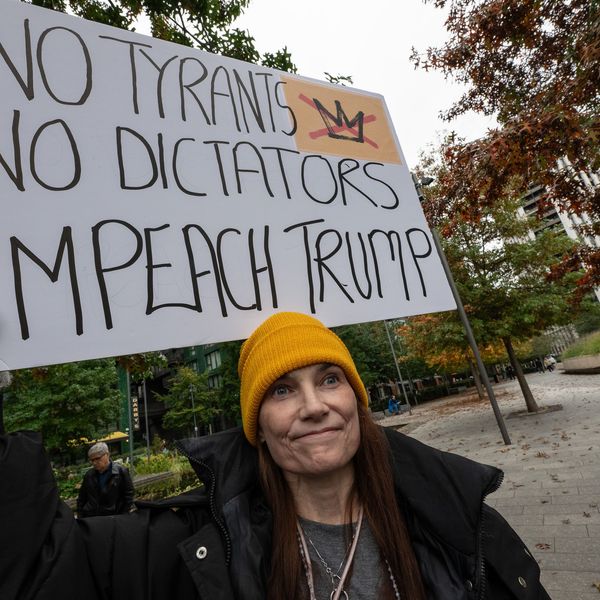Gen. Petraeus Makes McChrystal Look Like a Pacifist
A woman named Paula Broadwell, whose book about Gen. David Petraeus will be published shortly, touched some tender nerves with a couple of posts at Thomas Ricks's Best Defense at Foreign Policy. Michael Cohen at Democracy Arsenal summed it up.
There's been a lot of back and forth between Paula Broadwell and Josh Foust about the issue of village razing in Afghanistan. . . . I won't bother to summarize the entire discussion, but it began with what I think can be charitably described as Paula's less than empathetic response to an Afghan village being destroyed. What I find most striking [besides] the rather bloodless manner in which Broadwell describes the incident [is the] unintentional, insight into how dramatically the war in Afghanistan has shifted in opposition to the population-centric policies being espoused a year ago.
A lot of COIN advocates will tell you that . . . even though airstrikes are up 300% and targeted killings are on the rise and more homes are being destroyed since General David Petraeus took over command . . . it's still just counter-insurgency. But for those with long memories the operational approach . . . under General McChrystal was to avoid civilian casualties and even property destruction at all costs, even at the risk of putting US troops in harm's way. (Some even argued that protecting civilians was actually more important than killing insurgents).
Cohen reminds us that the all-merciful McChrystal even wrote: "Destroying a home or property jeopardizes the livelihood of an entire family -- and creates more insurgents. We sow the seeds of our demise."
The irony, of course, is that Petraeus was supposed to be the picture of moderation in contrast to Gen. Stanley McChrystal. Not only was the latter let go for indiscretions to Rolling Stone on the part of him and his staff, but, while in Iraq before his Afghanistan command, he helped with the cover-up of Cpl. Pat Tillman's death by friendly fire. Also, as Commander of Joint Special Operations Command in Iraq from 2003 to 2008, McChrystal acquired a reputation for ruthlessness. Along with killing al-Qaeda in Iraq leader Abu Musab al-Zarqawi, his unit killed or captured many other al-Qaeda leaders. It was also accused of abusing detainees.
Has Petraeus, then, bent and twisted counterinsurgency beyond all recognition? Near as I can tell, a main feature of COIN is that it's supposed to protect civilians. At this point, in Afghanistan, does anybody really know what counterinsurgency is anymore?
An Urgent Message From Our Co-Founder
Dear Common Dreams reader, The U.S. is on a fast track to authoritarianism like nothing I've ever seen. Meanwhile, corporate news outlets are utterly capitulating to Trump, twisting their coverage to avoid drawing his ire while lining up to stuff cash in his pockets. That's why I believe that Common Dreams is doing the best and most consequential reporting that we've ever done. Our small but mighty team is a progressive reporting powerhouse, covering the news every day that the corporate media never will. Our mission has always been simple: To inform. To inspire. And to ignite change for the common good. Now here's the key piece that I want all our readers to understand: None of this would be possible without your financial support. That's not just some fundraising cliche. It's the absolute and literal truth. We don't accept corporate advertising and never will. We don't have a paywall because we don't think people should be blocked from critical news based on their ability to pay. Everything we do is funded by the donations of readers like you. Will you donate now to help power the nonprofit, independent reporting of Common Dreams? Thank you for being a vital member of our community. Together, we can keep independent journalism alive when it’s needed most. - Craig Brown, Co-founder |
A woman named Paula Broadwell, whose book about Gen. David Petraeus will be published shortly, touched some tender nerves with a couple of posts at Thomas Ricks's Best Defense at Foreign Policy. Michael Cohen at Democracy Arsenal summed it up.
There's been a lot of back and forth between Paula Broadwell and Josh Foust about the issue of village razing in Afghanistan. . . . I won't bother to summarize the entire discussion, but it began with what I think can be charitably described as Paula's less than empathetic response to an Afghan village being destroyed. What I find most striking [besides] the rather bloodless manner in which Broadwell describes the incident [is the] unintentional, insight into how dramatically the war in Afghanistan has shifted in opposition to the population-centric policies being espoused a year ago.
A lot of COIN advocates will tell you that . . . even though airstrikes are up 300% and targeted killings are on the rise and more homes are being destroyed since General David Petraeus took over command . . . it's still just counter-insurgency. But for those with long memories the operational approach . . . under General McChrystal was to avoid civilian casualties and even property destruction at all costs, even at the risk of putting US troops in harm's way. (Some even argued that protecting civilians was actually more important than killing insurgents).
Cohen reminds us that the all-merciful McChrystal even wrote: "Destroying a home or property jeopardizes the livelihood of an entire family -- and creates more insurgents. We sow the seeds of our demise."
The irony, of course, is that Petraeus was supposed to be the picture of moderation in contrast to Gen. Stanley McChrystal. Not only was the latter let go for indiscretions to Rolling Stone on the part of him and his staff, but, while in Iraq before his Afghanistan command, he helped with the cover-up of Cpl. Pat Tillman's death by friendly fire. Also, as Commander of Joint Special Operations Command in Iraq from 2003 to 2008, McChrystal acquired a reputation for ruthlessness. Along with killing al-Qaeda in Iraq leader Abu Musab al-Zarqawi, his unit killed or captured many other al-Qaeda leaders. It was also accused of abusing detainees.
Has Petraeus, then, bent and twisted counterinsurgency beyond all recognition? Near as I can tell, a main feature of COIN is that it's supposed to protect civilians. At this point, in Afghanistan, does anybody really know what counterinsurgency is anymore?
A woman named Paula Broadwell, whose book about Gen. David Petraeus will be published shortly, touched some tender nerves with a couple of posts at Thomas Ricks's Best Defense at Foreign Policy. Michael Cohen at Democracy Arsenal summed it up.
There's been a lot of back and forth between Paula Broadwell and Josh Foust about the issue of village razing in Afghanistan. . . . I won't bother to summarize the entire discussion, but it began with what I think can be charitably described as Paula's less than empathetic response to an Afghan village being destroyed. What I find most striking [besides] the rather bloodless manner in which Broadwell describes the incident [is the] unintentional, insight into how dramatically the war in Afghanistan has shifted in opposition to the population-centric policies being espoused a year ago.
A lot of COIN advocates will tell you that . . . even though airstrikes are up 300% and targeted killings are on the rise and more homes are being destroyed since General David Petraeus took over command . . . it's still just counter-insurgency. But for those with long memories the operational approach . . . under General McChrystal was to avoid civilian casualties and even property destruction at all costs, even at the risk of putting US troops in harm's way. (Some even argued that protecting civilians was actually more important than killing insurgents).
Cohen reminds us that the all-merciful McChrystal even wrote: "Destroying a home or property jeopardizes the livelihood of an entire family -- and creates more insurgents. We sow the seeds of our demise."
The irony, of course, is that Petraeus was supposed to be the picture of moderation in contrast to Gen. Stanley McChrystal. Not only was the latter let go for indiscretions to Rolling Stone on the part of him and his staff, but, while in Iraq before his Afghanistan command, he helped with the cover-up of Cpl. Pat Tillman's death by friendly fire. Also, as Commander of Joint Special Operations Command in Iraq from 2003 to 2008, McChrystal acquired a reputation for ruthlessness. Along with killing al-Qaeda in Iraq leader Abu Musab al-Zarqawi, his unit killed or captured many other al-Qaeda leaders. It was also accused of abusing detainees.
Has Petraeus, then, bent and twisted counterinsurgency beyond all recognition? Near as I can tell, a main feature of COIN is that it's supposed to protect civilians. At this point, in Afghanistan, does anybody really know what counterinsurgency is anymore?

